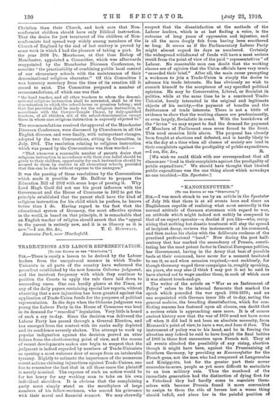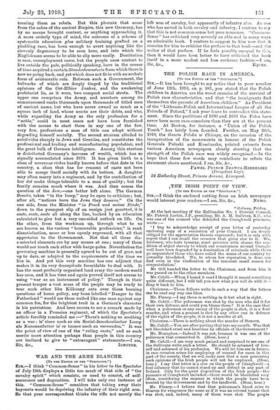" KANONENFUTTER."
[To TER EDITOR OP THE "Spun...mu:1 SIR, —I was much struck to see by an article in the Spectator of July 9th that there is at all events here and there an Englishman capable of realising what most assuredly is the normal attitude of German statesmen with regard to war, an attitude which might indeed not unfitly be compared to that of an expert operator—a dentist if you like—who, recog- nising that nothing but drastic treatment will stay the spread of incipient decay, reviews the instruments at his command, and then makes his choice with the deliberate coolness of the practised professional " hand." Now daring the past half- century that has marked the ascendency of Prussia, consti- tuting her the most potent factor in Central European politics, her Government, having in the Army that best of possible tools at their command, have never for a moment hesitated to use it, as and when occasion required,—not recklessly, for though Germany waged three campaigns in, roughly speaking, six years, she may also (I think I may put it so) be said to have elected not to wage another three, in each of which case it was almost touch-and-go.
The writer of the article on " War as an Instrument of Policy" refers to the internal ferments that marked the epoch which preceded the war epoch 1864-1870; and no one acquainted with German inner life of to-day, noting the general malaise, the brooding dissatisfaction, which for con- flicting reasons has fastened upon all classes, can doubt that a serious crisis is approaching once more. It is of course ancient history now that the war of 1870 need not have come off when it did had it not been an absolute necessity, from Bismarck's point of view, to have a war, and have it then. The instrument of policy was to his hand, and he in forcing the situation may indeed be said to have fought the final battles of 1866 in those first encounters upon French soil. They at all events clinched the possibility of any rising, abortive though it might have been, against the Prussianising of Southern Germany, by providing as Kanonenfutter for the French guns, not the men who had conquered at Langensalza and Koniggratz, but for the greater part their newer comrades-in-arms, people as yet more difficult to assimilate to an iron military rule. Thus the manhood of the immediate generation had the distinction of dying first for a Vaterland they had hardly come to associate them. selves with because Prussia found it more convenient to assign to them the r6le of heroes lest a worse thing should befall, and place her in the painful position of treating them as rebels. But this phoenix that arose from the ashes of the ancient Empire, this new Germany, has by no means brought content, or anything approaching it. A more orderly type of mind, the outcome of a scheme of systematic education plus military training grafted on a plodding race, has been enough to avert anything like the slovenly degeneracy to be seen here, and into which the Englishman seems to be able to slip more easily. Destitution is rare, unemployment rarer, but the people once content to live outside the pale, politically speaking, have in the course of time acquired a certain Standesbewustsein from which there is now no going back, and yet which does not fit in with an archaic form of aristocratic rule. Between such a Government, the bulwarks of which are deeply tinged by the traditional opinions of the Ost-Elbier Junker, and the awakening proletariat lie, as it were, two compact social strata. The upper one comprises the Army, and numbers among its commissioned ranks thousands upon thousands of titled men of ancient name, but who have never owned as much as a square inch of land, whose assets are their debts, and who, while regarding the Army as the only profession for a "noble," could in most cases not have been furnished with the means to start them in any one of the few, very few, professions a man of title can adopt without degrading himself socially. The second stratum alluded to subdivides sharply in Jews and Gentiles, and constitutes the professional and trading and manufacturing population, and the great bulk of German intelligence. Among this stratum is distributed Germany's increase of wealth, which has so signally accumulated since 1870. It has given birth to a class of nouveaux riches hardly known before that date in the country, a class that has for reasons of caste not been able to merge itself socially with its betters. A daughter may often marry into a regiment, and by the contribution of her dot make things tolerable to a man of quality ; but the family remains much where it was. And then comes the question of the Jew,—one better left alone. The German Semite, taken "in the lump," may be open to criticism; but, after all, "nations have the Jews they deserve." On the one side, from the Minister "in Frack and weisse Binde," down to the youngest slip of an ensign just gazetted, it is caste, caste, caste all along the line, backed by an education calculated to give but a very one-sided outlook on life. On the other, from the workman up, through what to us are known as the various "honourable professions," is rank dissatisfaction, more or less openly expressed, with all that appertains to the Government. Not that all these dis- contented elements are by any means at one ; many of them would not touch each other with barge-poles. Nevertheless the governing machine is generally agreed to be out of gear, not up to date, or adapted to the requirements of the time we live in. And yet this very machine has one adjunct that makes it in its very decrepitude formidable to deal with. It has the most perfectly organised land army the modern world has seen, and it has time and again proved itself not averse to using "war as an instrument of policy." Though in their present temper a vast mass of the people may be ready to tear each other like Kilkenny cats over those burning questions of home policy, any bone labelled " Danger to the Fatherland" would see them united like one mau against any common foe, for the brightest trait in a German's character is his patriotism. And here occurs to me a remark made by an officer in a Prussian regiment, of which the Spectator's article forcibly reminded me :—" There's nothing so soothing as a war : is' einer noch so ein Sozial-demokratischer Lump als Kanonenfutter is' er immer noch zu verwenden." It was the point of view of one of the " ruling caste," and as such merits more attention perhaps than people in this country are inclined to give to " extravagant" statements.—I am, Sir, &e.,







































 Previous page
Previous page